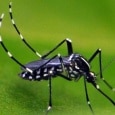5% of Zika Pregnancies Results in Birth Defects
Report from U.S. territories finds 120 newborns suffered range of devastating developmental problems
By Steven Reinberg
HealthDay Reporter
THURSDAY, June 8, 2017 (HealthDay News) — One in 20 women in the U.S. territories who were infected with Zika during pregnancy had babies with serious birth defects, officials reported Thursday.
The exact percentage of infants born with these Zika-linked defects depended on when during pregnancy the woman was infected, according to the U.S. Centers for Disease Control and Prevention report. Among women infected in the first trimester, 8 percent had a baby with defects; 5 percent in second trimester, and 4 percent in third trimester.
The findings also showed that birth defects could occur even in women who had no symptoms of Zika infection, CDC officials stressed.
In fact, 5 percent of those with symptoms gave birth to an infant with a birth defect, while 7 percent of those who had no symptoms had a baby born with a birth defect, said CDC Acting Director Dr. Anne Schuchat.
"Just because you don't have symptoms doesn't mean you're not infected," she noted during a media briefing. "There is no doubt that Zika virus infection during pregnancy diagnosed during any trimester can lead to severe birth defects.
"Although we are still learning about the full range of birth defects that can occur when a woman is infected with Zika during pregnancy, we know that it causes brain abnormality, vision problems and other devastating consequences of brain damage that might require lifelong specialized care," Schuchat added.
Some babies have seizures, while others have little or no control over their limbs and cannot reach out to touch things around them due to constricted joints, Schuchat said.
Others do not attain typical developmental milestones, like sitting up. Some have significant feeding difficulties and have trouble swallowing or breathing while eating, she added.
And there are babies who cry constantly and are often inconsolable, no matter what their caregiver does to soothe them, Schuchat said.
"The defects caused by Zika are not always obvious at birth," she noted. Some babies may be born with a normal head size, but may have underlying brain abnormalities, experience slow head growth and develop microcephaly after birth, she said.
Continued
"Just because the baby doesn't have microcephaly doesn't mean they won't have vision issues or hearing issues," added Dr. Jill Rabin, co-chief of ambulatory care in Women's Health Programs and PCAP Services at Northwell Health in New Hyde Park, N.Y. "Problems may not show up until the child is 4 years old."
"That's why identification of and follow-up care of babies with possible Zika virus infection is crucial — it ensures that babies get the proper care," Schuchat said.
The findings, published in the June 8 issue of the CDC's Morbidity and Mortality Weekly Report, reviewed more than 2,500 cases of pregnant women in the U.S. territories with possible Zika virus infection. Among these women, more than 1,500 cases of Zika were confirmed.
More than 120 of these pregnancies resulted in infants with Zika-linked birth defects, Schuchat said.
This report is the first from the U.S. territories and includes the largest number of completed pregnancies with confirmed cases of Zika infection to date, the CDC said.
These data were compiled from American Samoa, Puerto Rico, the Federated States of Micronesia, the Republic of Marshall Islands, and the U.S. Virgin Islands from Jan. 1, 2016, to April 25, 2017.
These findings are consistent with a recent report on cases of Zika among women living in U.S. states who had traveled to Zika-infested areas, the researchers said.
According to the latest report, 59 percent of these infants were tested for Zika at birth, 52 percent underwent head scans, and 79 percent had their hearing screened at birth, all in accordance with CDC guidelines.
Although Zika has been beaten back with mosquito control programs in many areas, the virus may not be totally eliminated. The CDC continues to warn women and their partners who are considering pregnancy not to travel to Zika-infested areas.
The CDC also urges women to talk to their doctor so that they know the risks and ways to prevent exposure to the mosquitoes that carry Zika.
WebMD News from HealthDay
Sources
SOURCES: Jill Rabin, M.D., co-chief, ambulatory care, Women's Health Programs, PCAP Services, Northwell Health, New Hyde Park, N.Y.; June 8, 2017, media briefing with Anne Schuchat, M.D., acting director, U.S. Centers for Disease Control and Prevention; June 8, 2017, Morbidity and Mortality Weekly Report




